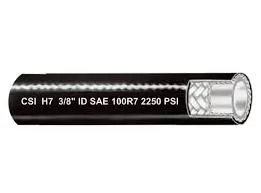Nov . 05, 2024 14:09 Back to list
thermoplastic hose product
Understanding Thermoplastic Hose Products Features, Applications, and Benefits
Thermoplastic hoses are advanced flexible tubing solutions made from synthetic materials that exhibit versatile physical properties. Unlike traditional rubber hoses, thermoplastic hoses are engineered to deliver outstanding performance across various applications. Their unique characteristics make them ideal for industries such as agriculture, construction, automotive, and many more. In this article, we will explore the features, applications, and benefits of thermoplastic hose products.
Key Features of Thermoplastic Hoses
One of the primary features of thermoplastic hoses is their excellent chemical resistance. These hoses can withstand exposure to a wide range of chemicals, oils, and solvents without degrading. This makes them suitable for applications in industries where fluid transfer is essential, such as petrochemical and food processing sectors.
Another significant advantage is their lightweight and flexible design. Thermoplastic hoses are considerably lighter than rubber hoses, reducing overall system weight and making them easier to handle and install. This flexibility allows for tight bends and configurations that can navigate complex machinery layouts, enhancing their usability in various applications.
Thermoplastic hoses are also known for their durability and longevity. They can endure extreme temperature variations, typically ranging from -40°F to 212°F (-40°C to 100°C), and can maintain structural integrity under pressure. This resilience helps minimize downtime and maintenance costs, making them a cost-effective solution for many businesses.
Diverse Applications
The versatility of thermoplastic hoses allows them to be used in numerous applications across different industries
1. Agriculture In agricultural settings, thermoplastic hoses are commonly used for irrigation systems, pesticide spraying, and fuel transfer. Their chemical resistance and flexibility make them perfect for handling various fluids safely.
2. Automotive In the automotive sector, these hoses are used for fuel transfer, brake systems, and coolant lines. Their compatibility with a broad range of fluids and gases ensures efficient performance.
3. Construction In construction, thermoplastic hoses are frequently used for conveying air, water, and concrete. Their ability to withstand harsh environmental conditions makes them ideal for rugged job sites.
thermoplastic hose product

4. Manufacturing Many manufacturing processes rely on thermoplastic hoses for fluid transfer and cooling applications. Their high-pressure capabilities and resistance to abrasion make them suitable for demanding environments.
5. Food and Beverage In the food processing industry, thermoplastic hoses are used for transporting liquids and gases. Their compliance with health regulations and resistance to bacterial growth are crucial for ensuring food safety.
Advantages of Using Thermoplastic Hoses
The benefits of thermoplastic hoses extend beyond their versatility and durability. Here are some additional advantages
- Reduced Weight The lightweight nature of thermoplastic hoses contributes to lower shipping costs and easier handling during installation.
- Ease of Maintenance These hoses are easy to clean, contributing to better hygiene practices in industries that require stringent cleanliness standards.
- Cost-Effectiveness Despite their advanced features, thermoplastic hoses are often more affordable than traditional rubber hoses, offering businesses a budget-friendly option without compromising quality.
- Environmental Resistance Many thermoplastic hoses are designed to endure UV exposure and resist environmental degradation, making them suitable for outdoor applications.
Conclusion
In summary, thermoplastic hoses are a remarkable advancement in hose technology, providing numerous features and benefits that cater to a wide array of industries. Their lightweight, flexible design, coupled with excellent chemical resistance and durability, makes them an attractive choice for both manufacturers and end-users. As industries continue to evolve and demand more efficient and reliable solutions, thermoplastic hoses will undoubtedly remain at the forefront of fluid transfer technology. Whether in agriculture, automotive, construction, or manufacturing, the adoption of thermoplastic hose products is a testament to innovation and quality in industrial applications.
-
Best Four Steel Wire Spiral Hose Hydraulic R12 – Durable High-Pressure Hose Manufacturer
NewsJul.08,2025
-
High-Quality 1/4 Hydraulic Hose – Soft, Flexible & Durable Rubber Hoses for Industrial Use
NewsJul.08,2025
-
1 1 2 Inch Hydraulic Flexible Hose - Durable, Reliable, High-Pressure Solutions
NewsJul.07,2025
-
High-Quality 1 2 Rubber Hose - Durable, Flexible Hydraulic Solutions
NewsJul.07,2025
-
Discover SAE Hydraulic Hose Types - High Quality & Durable Hoses from Leading Factory Supplier
NewsJul.06,2025
-
High Pressure Wire Hydraulic Rubber Hose Supplier Durable & Reliable 1SN Hose Solutions
NewsJul.06,2025
